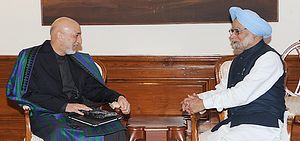Afghan President Hamid Karzai began a four-day official visit to India this Thursday during which he is expected to meet with Indian Prime Minister Manmohan Singh to discuss the future of the Afghan-Indian relationship. Karzai will also speak with Indian Foreign Minister Salman Khurshid. Among other issues on the agenda, the visit could precipitate the signing of the United States-Afghanistan Bilateral Security Agreement (BSA) — something the United States hopes India will persuade Karzai to do during his visit to the country. The visit comes after Karzai was in Iran to sign a partnership agreement.
Earlier in India, Hamid Karzai caused some concern with his call for more profound defense ties, which was perceived in India as a laundry list of demands for equipment and assistance. According to the Hindustan Times, “India is treading a cautious path even as Kabul has again raised the pitch for deeper military ties — that includes supply of tanks and artillery guns — citing domestic constraints and geo-political fallouts.” This support is in addition to India’s $2 billion assistance program in Afghanistan’s reconstruction. Karzai made similar pushes for equipment during his February visit to the United States, when he personally requested heavy artillery and other equipment from President Obama.
Karzai’s specific list of demands from India includes a set of heavy weaponry, including “150 battle tanks, field guns, howitzers and one squadron of attack helicopters.” India has traditionally been hesitant to provide lethal equipment of the sort being requested by Karzai, but is likely to provide additional non-lethal assistance in the form of transport aircraft and other supplies. India and Afghanistan are also expected to deepen their cooperation on training and counter-terrorism operations.
Afghanistan’s Pajhwok news agency reported that in addition to these issues, “Other key issues expected to figure during the talks would include [the] proposed Afghan-US security pact which Karzai has refused to ink demanding that the US must put an immediate end to military raids on Afghan homes and demonstrate its commitment to peace talks.” It remains to be seen whether Indian encouragement will be able to persuade Karzai to sign the BSA on time.
James Dobbins, the U.S. Special Representative for Afghanistan and Pakistan stated that Karzai’s “visit to India could … be quite influential because he highly respects and has good relations with the Indian government.” President Obama had broached the issue of India assisting the United States in reigning Karzai in when the two leaders met in Washington D.C. in September. As I noted yesterday in The Diplomat, the push for a continued U.S. troop presence in Afghanistan finds almost universal acceptance across the region — with the notable exception of Iran.
India is likely to resist Karzai’s demands for heavy equipment. Despite a concerted Indian effort to deepen its strategic relationship with Afghanistan, India remains wary of growing entrenched in Afghanistan’s ongoing struggle against the Taliban. In addition to raising eyebrows in Pakistan over concerns of Indian encirclement, India has faced attacks from the Taliban in Kabul — its embassy has been bombed twice, and its consulate near the Pakistani border once.
India, however, has a vested interest in Afghanistan successfully moderating its threat from the Taliban and working its way towards peace and reconciliation. For New Delhi, an ideal scenario would achieve this objective with minimal security assistance from India. Where India doesn’t shy away from being visible in Afghanistan is on economic and trade matters — Afghanistan relies on India as a major partner in this regard. The post-2014 situation in the country will involve a struggle between India and Pakistan for influence in Afghanistan. Therefore, Karzai’s overtures today will have deep implications for India’s security posture after coalition troops withdraw and Pakistan once again vies for influence over Kabul.

































